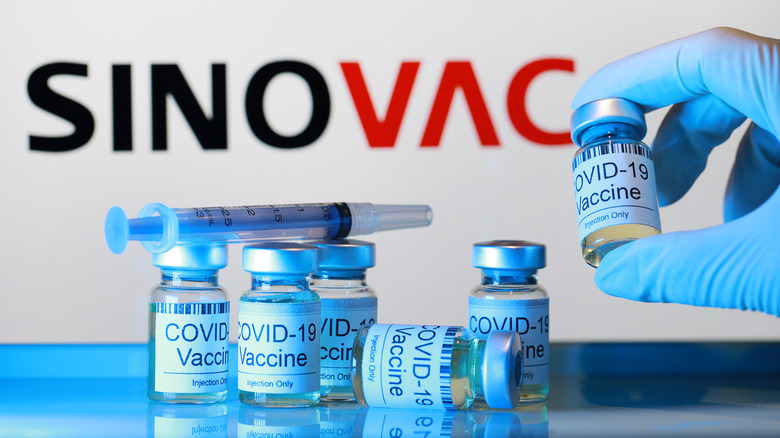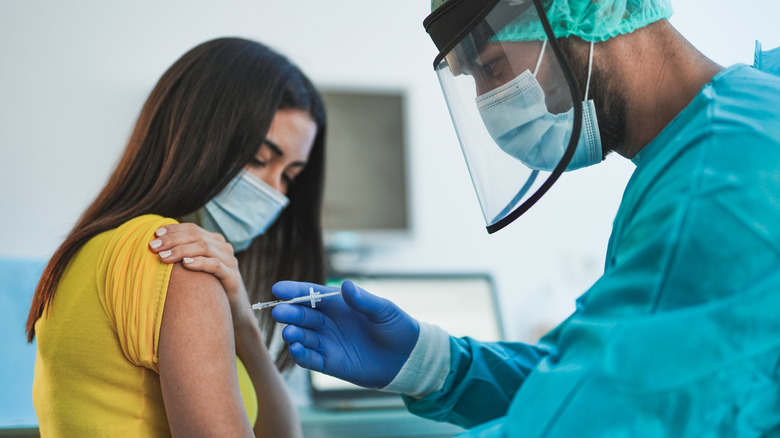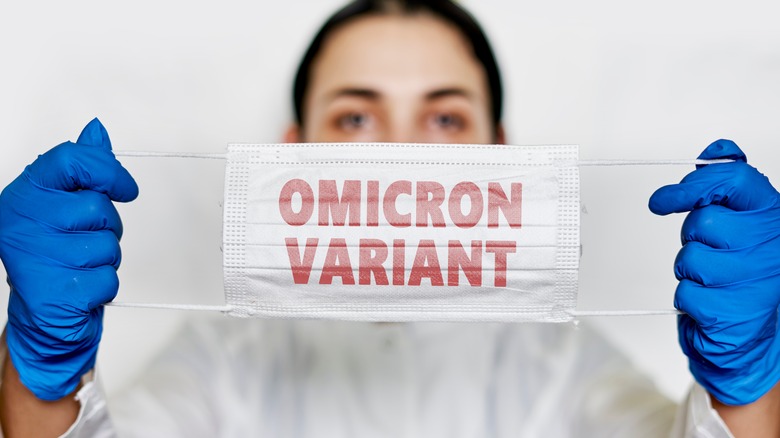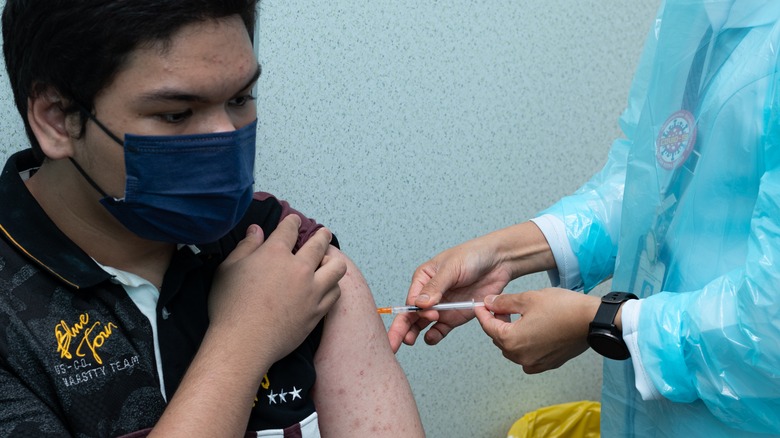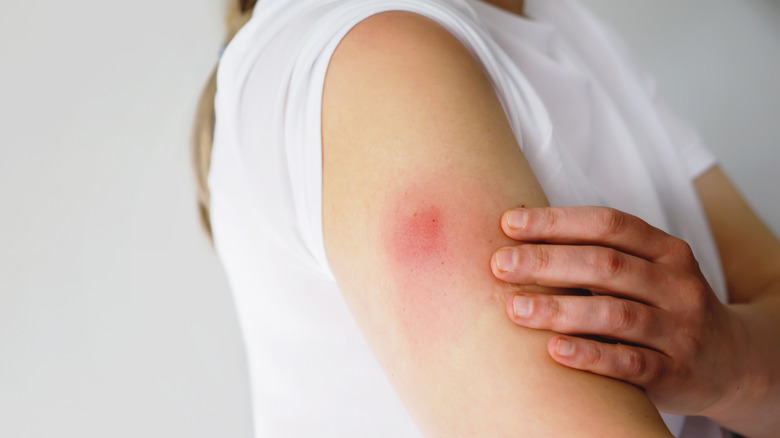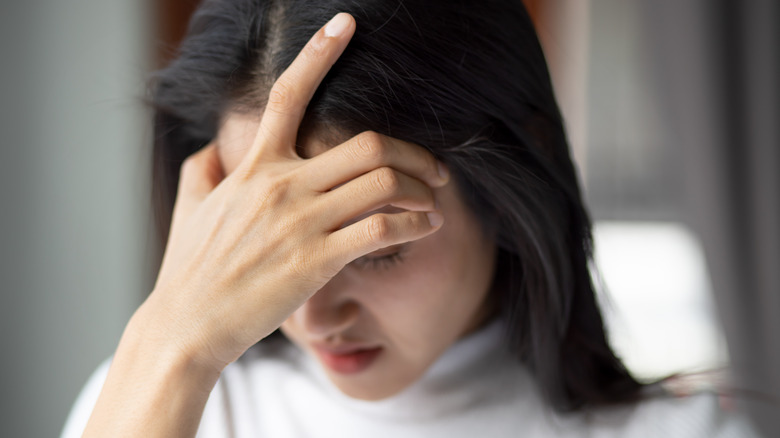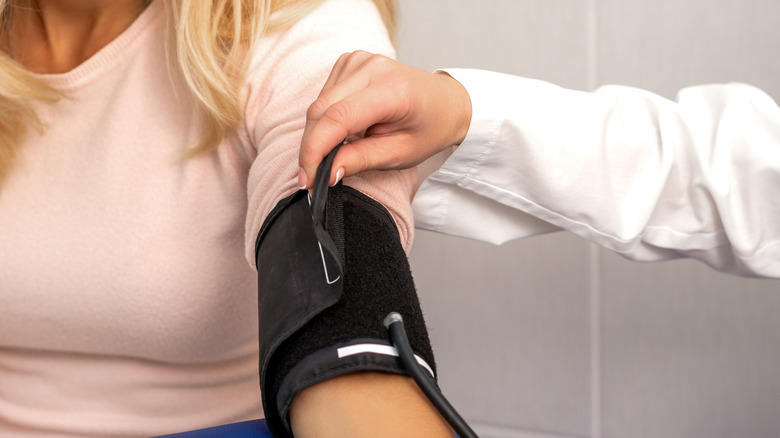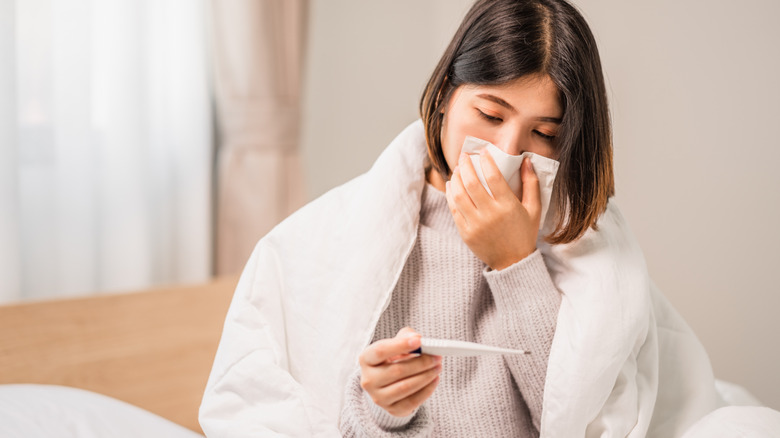If You Get The Sinovac COVID-19 Vaccine, This Is What Happens To Your Body
Sinovac is a vaccine for COVID-19 manufactured by China-based pharmaceutical company Sinovac Biotech. The vaccine, also known as CoronaVac, is widely used in countries outside the U.S. The World Health Organization approved the vaccine for Emergency Use Listing on June 1 and the Strategic Advisory Group of Experts on Immunization (SAGE) approved it for use in 26 countries on June 9. It is one of several vaccines available for COVID-19, according to Medical News Today.
The many vaccines available for COVID-19 work in different ways. Some, such as the Pfizer-BioNTech and Moderna vaccines, use laboratory-created mRNA to teach your body's cells how to make a protein that triggers an immune response, per the Mayo Clinic. Vector vaccines, like the one offered by Oxford-AstraZeneca, use genetic material to prompt cells to replicate a certain protein, which then stimulates an immune response. Subunit vaccines contain parts of a virus protein that cause your body to build an immunity to the virus if you ever get it, basically preventing the virus from replicating.
Sinovac is yet another type of vaccine. It is an inactivated vaccine, and it works by using an inactive (or dead) pathogen of the COVID-19 virus to stimulate the body's immune response. Sinovac contains aluminum hydroxide, a compound that boosts its effectiveness. Your body recognizes the pathogen as foreign, which causes a biological response. That response builds "immune memory," which allows your body to fight off any COVID-19 germs you may encounter in the future, according to Immunology. Inactivated vaccines have been used since the late 1800s for disease such as smallpox, plague, cholera, and typhoid. Currently, inactivated vaccines are used against hepatitis A, influenza, rabies, polio, and rabies, per Verywell Health.
Vaccines usually have some side effects, and we've covered a few of the things you should expect to happen to your body after getting a Sinovac vaccine.
You will probably need more than one dose
Since the pathogens used in the Sinovac vaccine are dead, they cannot replicate or cause the virus (via Medical News Today). Inactivated vaccines can cause a strong immune reaction, but in most cases, it is not as strong as mRNA vaccines. For this reason, many inactivated vaccines require a booster for continued protection against COVID. Generally, inactivated vaccines are not as durable as other vaccines because the body recognizes live viruses better than it does dead or inactive ones. For example, live vaccines for mumps and measles only require two doses, and they generally provide protection from the disease for a lifetime. Inactive vaccines, on the other hand, require boosters ranging from every six months to every five years, per Verywell Health.
Most inactive vaccines, such as the one for hepatitis A, require two doses. A rabies shot usually involves three doses. However, much of the population receives a flu shot once a year. The recommended dosage for Sinovac is two doses. For persons over 60 years of age, a third dose is suggested. People with moderate or severely compromised immune systems should also seek a third dose, according to UN News. The World Health Organization (WHO) recommends waiting at least two to four weeks between doses.
You have protection from COVID-19
Inactivated vaccines like Sinovac are considered safe for use against COVID-19 primarily because they cannot infect someone with the virus. As far as protecting you from getting the virus, current data suggests that it can. A study published in the journal Emerging Microbes and Infections involved a small sample of 628 people between the ages of 18 and 59, and it showed that two doses of the Sinovac vaccine were 59% effective against preventing COVID-19 and 70% effective at preventing moderate COVID-19 symptoms. The data also showed the shot to be 100% effective at preventing severe cases of the virus, though this percentage might be exaggerated due to the small sample size.
A separate, larger study showed similar results. The New England Journal of Medicine published data from a study that observed approximately 10 million people in Chile, which revealed that Sinovac was 65% effective in preventing the virus, 87% effective at preventing hospitalization, and 90% effective at preventing admission to the ICU. Overall, researchers concluded that Sinovac was "highly effective" in preventing severe disease and death. The WHO also referenced research from a Brazilian study that indicated the vaccine had an efficacy rate of 51% against COVID-19 infection and 100% efficacy against severe and cases and hospitalization.
You may not be protected against Omicron
While Sinovac offers some protection from the early variants of COVID-19, it does not provide the same safety against the Omicron variant of the virus. A study published by Yale University showed that Sinovac did not provide protection from the virus, adding that research suggests a "greater risk of vaccine breakthrough infections." Another study published by the University of Hong Kong revealed that a third dose of Sinovac did not provide "adequate levels of protective antibody."
There is still much to learn about Omicron, but early research shows that vaccine effectiveness against Omicron is lower than it is for other variants of COVID-19. That said, protection against severe disease is much higher for people who are vaccinated, boosted, or in need of a booster, according to Reuters. The good news is that people who have already received an inactive vaccine can increase their odds of becoming infected with Omicron by getting a third dose of BioNTech's mRNA vaccine, according to the report.
You might need another booster
You can boost the effectiveness of a Sinovac vaccine in preventing COVID-19 and any variants, including Omicron, by pairing it with a booster shot of another vaccine. The WHO states that it is safe to take a booster offered by Pfizer, Moderna, AstraZeneca, or Janssen. A booster shot can also be used as a second dose following one shot of Sinovac. In addition, data from the University of Hong Kong research revealed that two doses of the Sinovac vaccine coupled with a booster shot of an mRNA vaccine resembled antibody levels similar to what two doses of an mRNA vaccine would produce.
That said, a study published in The Lancet showed that a third dose of Sinovac given two months after the first doses "moderately increased neutralizing antibody levels." The research also noted that a third dose administered eight months after the first two doses was "highly effective" at providing immunity, although more research is needed.
You might experience pain at the injection site
Most shots hurt a little bit, so you should expect a little pain after getting yours. Research published in The Lancet revealed that the most prevalent side effect of the Sinovac vaccine was pain at the injection site. Severe allergic reactions are rare but also possible, according to the Food and Drug Administration (FDA).
A sore arm is actually a common side effect with the Pfizer-BioNTech and Moderna shots as well, per Healthline. Along with pain, you may experience swelling, itching, or a rash around the injection site. The area might feel warm to the touch, and you could feel a lump where the shot was administered. These symptoms are believed to be part of your body's immune reaction, and generally last from three to five days.
You can treat these symptoms with a cold compress to reduce swelling. You might also want to take over-the-counter pain medication and/or antihistamines to help ease the symptoms. If the pain in your arm lingers for more than a few days, speak with your doctor about your concerns.
You could get a headache
You might develop a headache after receiving any Sinovac shots. Like pain or a rash around the injection site, a headache is a common side effect of most vaccines. Vaccines fool your body into thinking that a virus is present, thereby teaching your body how to respond to an actual virus, scientist and researcher Dr. Amit Kumar explained to PopSugar. Headaches may also be more common after a second dose of a vaccine because your body has already begun to develop antibodies after the first dose. Either way, don't be alarmed if your head hurts after getting a vaccine.
Treat a headache after you get a vaccine like you would treat any other headache. As Michael S. Calderwood, MD, MPH, told PopSugar, you can take over-the-counter medication if necessary. If you develop a migraine, it is fine to take any medications you use to treat them. If your headache lasts longer than a few days or is more severe than most headaches you have, you should contact your physician.
You may feel fatigue
Fatigue is another common side effect of just about any COVID-19 vaccine. You might not enjoy feeling tired, but it's actually a good sign, according to Dr. Natasha Bhuyan, One Medical's regional medical director. She told Bustle that fatigue is a sign that your immune system is working. "As our immune system mobilizes cells to fight off the virus in the future, it's normal for us to feel a sensation of fatigue," she added.
Keep in mind that you may feel more tired after the second dose than you did the first. That, too, is normal. Similar to why you get a headache, you could feel wiped out because your immune system has developed antibodies. There is also a chance that you could feel worse after your second dose. Just like with a headache, fatigue is a sign that your immune system is kicking in, according to Bhuyan.
The best thing you can do if you're feeling tired is rest until you feel better. Avoid vigorous activities, refrain from over-exerting yourself, and stay hydrated. If you don't start feeling better after 48 hours, Bhuyan suggests talking to your doctor.
Your blood pressure might go up
Sinovac might also cause your blood pressure to increase. According to the FDA, high blood pressure is one of the top adverse reactions to inactivated and vector vaccines.
Other cardiovascular events have been reported from individuals after receiving other vaccines in all age groups and genders. While a direct cause has yet to be determined, data from the International Journal of General Medicine suggested that the increase could be attributed to anxiety related to getting the shot. The report also noted that vaccines were first administered to the elderly and those with comorbidities who may have already had pre-existing conditions, which may have influenced the outcome of the analysis.
Furthermore, research does not link vaccines to high blood pressure. In partnership with the FDA, the American Heart Association (AHA) conducted trials on people over 65 with cardiovascular issues, such as a history of heart attacks, high blood pressure, or chronic obstructive pulmonary disease, and concluded that vaccines are safe. Dr. Purvi Parwani, a cardiologist at the Loma Linda University International Heart Institute, agreed with this, adding, "Millions of people have been vaccinated so far, and we haven't seen any dangerous trends in the vaccines." In addition, the AHA says that people with heart diseases should get vaccinated because becoming infected with COVID-19 is much riskier than getting the shot.
Who should and shouldn't take Sinovac
Because inactivated vaccines like Sinovac require additional doses, they are more appropriate for people with weakened immune systems, according to Medical News Today. They are also safer for most people, as there is no chance of the ingredients infecting people (since they do not contain live versions of the virus and generally contain smaller amounts of the virus), according to GoodRx. Additionally, they are recommended for people with comorbidities such as obesity and cardiovascular and respiratory diseases, per the WHO. While no studies have been conducted on how people with HIV respond to Sinovac, it is considered safe since it is non-replicating.
While there isn't much research to show how Sinovac might affect pregnant women, it is currently considered to be safe. In addition, women who are breastfeeding should not avoid getting the shot. That said, research is limited on just how inactivated COVID-19 vaccines will affect certain people. You should discuss all of these issues with your doctor to decide which vaccine is best for you (via WHO).
If you have had COVID-19, you should wait up to six months after being infected before getting a Sinovac shot. If you currently have any variations of COVID-19 or have tested positive, you should not get vaccinated. Furthermore, if you have a fever over 101.3 degrees, you should wait until the fever is gone before taking any vaccine. The WHO also states that if you have any history of anaphylaxis, you should not take Sinovac. Moreover, make sure to get fully vaccinated before you begin chemotherapy or get an organ transplant (per GoodRx).

